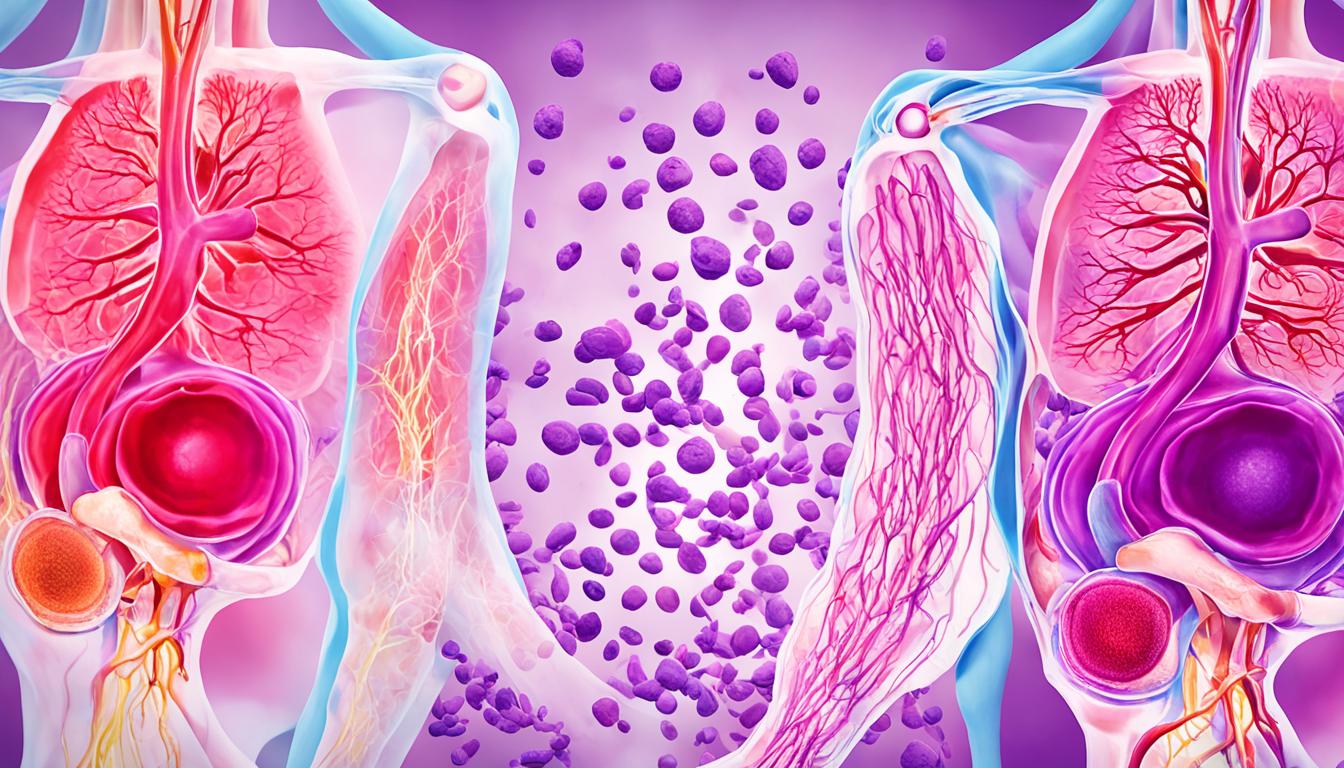Hyperthyroidism occurs when the thyroid overproduces hormones. Key symptoms include weight loss despite increased appetite, rapid or irregular heartbeat, nervousness, irritability, fatigue, trouble sleeping, tremors, muscle weakness, heat intolerance, and frequent bowel movements.
Key Takeaways
- Hyperthyroidism is excessive thyroid hormone production, causing various symptoms.
- Common symptoms are weight loss, increased appetite, rapid heartbeat, nervousness, irritability, and fatigue.
- Causes include Graves’ disease, thyroid nodules, and thyroid gland inflammation.
- Diagnosis involves measuring hormone levels, thyroid scans, and ultrasounds.
- Treatment options are medications, radioactive iodine, and stem cell therapy.
Understanding hyperthyroidism’s underlying causes, symptoms, and treatment is crucial. Hyperthyroidism can result from various factors like Graves’ disease, thyroid nodules, and thyroid inflammation.
Effective management and preventing complications depend on accurate diagnosis. Tests include measuring thyroid hormone and TSH levels and conducting thyroid scans and ultrasounds.
Treatment aims to control hormone levels and relieve symptoms. Options include medications, radioactive iodine therapy, and, in some cases, stem cell therapy.
Understanding Overactive Thyroid (Hyperthyroidism)
Hyperthyroidism means the thyroid gland overproduces thyroid hormones. The thyroid gland produces thyroxine (T4) and triiodothyronine (T3). These hormones regulate body metabolism.
What is Hyperthyroidism?
The thyroid gland produces excessive thyroid hormones in hyperthyroidism. This increases the body’s metabolic rate. Symptoms include weight loss, increased appetite, rapid heartbeat, and irritability.
Causes of Hyperthyroidism
Hyperthyroidism can result from autoimmune disorders, nodular thyroid disease, or certain medications. Understanding the underlying cause is crucial for effective treatment.
Graves’ Disease – A Common Cause
Graves’ disease is a common hyperthyroidism cause. It’s an autoimmune disorder where antibodies stimulate excessive thyroid hormone production. Graves’ disease leads to hyperthyroidism in the U.S. and worldwide.
Symptoms and Complications of Overactive Thyroid
The thyroid gland can produce excessive hormones. This leads to noticeable and subtle symptoms, often mistaken for anxiety. Understanding these signs is crucial for seeking medical attention promptly.
Recognizing hyperthyroidism’s common signs ensures timely treatment. This prevents potential complications from developing.
Common Symptoms of Hyperthyroidism
People with an overactive thyroid often experience weight loss despite increased appetite. They may have rapid or irregular heartbeats, nervousness, irritability, and fatigue coupled with trouble sleeping.
Tremors, muscle weakness, heat intolerance, and frequent bowel movements are other common symptoms. These can significantly impact daily life and overall well-being.
Potential Complications if Left Untreated
Unmanaged hyperthyroidism can lead to serious complications, including heart problems. Atrial fibrillation, heart failure, and osteoporosis are potential risks.
Excessive thyroid hormones may cause eye problems, known as Graves’ ophthalmopathy. Thyroid storm, a life-threatening condition with fever, rapid heartbeat, and confusion, is another risk.
Prompt medical attention addresses the underlying condition. This prevents potentially severe consequences from developing.
Diagnosis and Treatment Options for Overactive Thyroid
Diagnosing an overactive thyroid, or hyperthyroidism, involves several steps. Doctors evaluate symptoms, conduct physical exams, and order lab tests.
Key tests measure thyroid hormone levels like thyroxine (T4), triiodothyronine (T3), and thyroid-stimulating hormone (TSH). Thyroid scans and ultrasounds assess the gland’s structure.
Diagnostic Tests for Hyperthyroidism
The primary tests diagnose hyperthyroidism by measuring thyroid hormone levels. These include thyroxine (T4), free T4, triiodothyronine (T3), and thyroid-stimulating hormone (TSH).
Doctors may also recommend thyroid scans and ultrasounds. These evaluate the thyroid gland’s structure and function.
Conventional Treatment Methods
After diagnosing hyperthyroidism, doctors recommend conventional treatments. Options include anti-thyroid medications, radioactive iodine therapy, or surgery.
Treatment plans depend on the condition’s cause, symptom severity, and patient health. Patient preferences also guide treatment decisions.
Stem Cell Therapy for Overactive Thyroid
Emerging research explores stem cell therapy for overactive thyroid. This innovative approach uses stem cells’ regenerative properties.
The goal is restoring normal thyroid function, offering an alternative treatment. Discuss potential benefits and risks with your healthcare provider.
FAQ
Q: What is hyperthyroidism?
A: Hyperthyroidism is the overproduction of thyroid hormones. The thyroid gland produces too much thyroxine (T4) and triiodothyronine (T3). These hormones regulate the body’s metabolism.
Q: What are the symptoms of hyperthyroidism?
A: Symptoms include weight loss despite increased appetite. Other signs are rapid heartbeat, nervousness, irritability, fatigue, trouble sleeping, tremors, muscle weakness, and heat intolerance. There may also be frequent bowel movements.
Q: What causes hyperthyroidism?
A: The main cause is Graves’ disease, an autoimmune disorder. The body’s immune system attacks the thyroid gland, causing overproduction of hormones.
Q: How is hyperthyroidism diagnosed?
A: Doctors diagnose it based on symptoms, clinical signs, and lab tests. They measure thyroid hormone levels (T4, free T4, T3) and TSH. Thyroid scans and ultrasounds help diagnose it accurately.
Seeing an endocrinologist (hormone specialist) is recommended.
Q: What are the treatment options for hyperthyroidism?
A: Conventional treatments include anti-thyroid medications, radioactive iodine therapy, and surgery. A new promising option is stem cell therapy for overactive thyroid.

